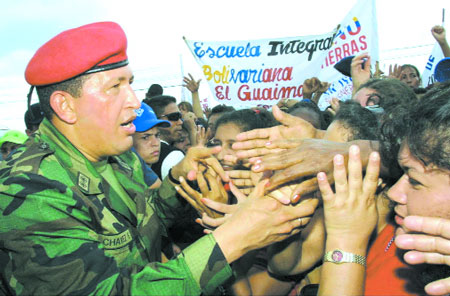Filmmakers tackle Venezuelan politics and Chavez’s near ouster
Singer Gil Scott-Heron never trademarked the title of his 1974 song, “The Revolution Will Not Be Televised,” and Irish directors Kim Bartley and Donnacha O’Briain have borrowed it for their new documentary about the very short-lived coup d’état in Venezuela last year.
Ironically, their film was made for television and will be shown on HBO next year. However, the title fits: the mainstream media is the chief villain.
“The Revolution Will Not Be Televised” began as a portrait of Venezuelan president Hugo Chavez. Elected in 1998 by a wide majority, Chavez promised to redistribute the wealth of Venezuela’s oil refineries to the country’s entire population, 80 percent of whom live in poverty. His leftist positions made him persona non grata with the American government, as is made clear in several clips of Secretary of State Colin Powell condemning Chavez. Nor did Chavez receive kind treatment from the privately owned Venezuelan TV industry, which accused him of being insane and having a sexual fixation with Fidel Castro.
On April 11, 2002, a protest march, organized by the anti-Chavez CTV union, was held in Caracas. It was deliberately designed to create chaos by forcing protesters to clash with Chavez supporters at the presidential palace. In the ensuing melée, snipers shot into the crowd. The government was widely blamed for the violence and a coup was quickly staged.
After coming to power, Chavez used Channel 8, a government-owned TV station, as his mouthpiece, hosting a weekly call-in show. Well aware of the media’s power, Chavez complained to his staff that they did little outreach to other television outlets. However, the five corporate-owned TV stations, with ties to the oil industry, were biased against him. In Chavez’s early days in power, their opposition took the form of legitimate, if petty, digs.
Once the coup came about, however, Chavez’s opponents in the media began to play hardball. At one point, they doctored footage of Chavez supporters firing down on the street to make it look like the government was firing on protesters. The footage had been cut to exclude a pan that showed that the street was empty.
Bartley and O’Briain make no pretense of objectivity – the film is a blunt example of advocacy journalism. Intelligentsia within Venezuela intelligentsia opposed to Chavez are missing from this film. Instead, over and over we see clueless bourgeoisie warning each other about the danger posed by their servants. The film’s first half-hour makes a good case for Chavez’s merits, but its depiction of his opponents is akin to fishing in an aquarium.
Politics aside, “The Revolution Will Not Be Televised” is a gripping drama, even knowing the coup’s outcome in advance. Bartley and O’Briain had the good fortune to be on the frontlines, able to capture the progression of events.
Power flies in all directions. Five minutes after celebrating in the presidential palace, the new attorney general is a prisoner in the basement.
“The Revolution Will Not Be Televised” combines the immediacy of TV reportage with the scope and perspective of a well-researched book. As much as it criticizes the media, the film itself is a good example of what the news media could be if it were more interested in telling complex stories.


































